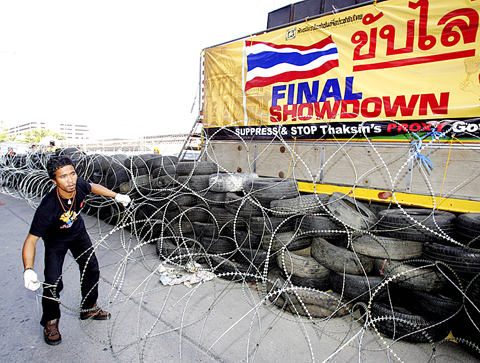Thai Prime Minister Somchai Wongsawat sacked his national police chief yesterday.
General Patcharawat Wongsuwan, who was moved to an inactive post, had resisted previous orders to crack down on the street protesters who began a “final battle” to unseat the government on Monday, Thai media reported.
“The removal was the result of his performance during this current crisis,” government spokesman Nattawut Saikuar told NBT television a day after Somchai had declared a state of emergency to end two crippling airport sieges.

PHOTO: AP
Riot police with truncheons and shields gathered at Bangkok’s Suvarnabhumi airport yesterday and ordered protesters from the People’s Alliance for Democracy to leave immediately, as anti-government leaders rejected last-ditch attempts to negotiate an end to the crisis.
In an earlier televised address, Somchai had said the government would use “gentle measures” against the protesters.
“Don’t worry. Officials will use gentle measures to deal with them,” Somchai said, inviting human rights and media organizations to observe and film the process.
Earlier, police said they hoped talks with protest leaders would end the siege, but warned they would “take other steps” if they failed.
“We are asking them to allow the airport to resume operations,” Lieutenant-General Suchart Muenkaew, the chief police negotiator, told reporters.
See Deepening on page 9

WAITING GAME: The US has so far only offered a ‘best rate tariff,’ which officials assume is about 15 percent, the same as Japan, a person familiar with the matter said Taiwan and the US have completed “technical consultations” regarding tariffs and a finalized rate is expected to be released soon, Executive Yuan spokeswoman Michelle Lee (李慧芝) told a news conference yesterday, as a 90-day pause on US President Donald Trump’s “reciprocal” tariffs is set to expire today. The two countries have reached a “certain degree of consensus” on issues such as tariffs, nontariff trade barriers, trade facilitation, supply chain resilience and economic security, Lee said. They also discussed opportunities for cooperation, investment and procurement, she said. A joint statement is still being negotiated and would be released once the US government has made

NEW GEAR: On top of the new Tien Kung IV air defense missiles, the military is expected to place orders for a new combat vehicle next year for delivery in 2028 Mass production of Tien Kung IV (Sky Bow IV) missiles is expected to start next year, with plans to order 122 pods, the Ministry of National Defense’s (MND) latest list of regulated military material showed. The document said that the armed forces would obtain 46 pods of the air defense missiles next year and 76 pods the year after that. The Tien Kung IV is designed to intercept cruise missiles and ballistic missiles to an altitude of 70km, compared with the 60km maximum altitude achieved by the Missile Segment Enhancement variant of PAC-3 systems. A defense source said yesterday that the number of

Authorities have detained three former Taiwan Semiconductor Manufacturing Co (TMSC, 台積電) employees on suspicion of compromising classified technology used in making 2-nanometer chips, the Taiwan High Prosecutors’ Office said yesterday. Prosecutors are holding a former TSMC engineer surnamed Chen (陳) and two recently sacked TSMC engineers, including one person surnamed Wu (吳) in detention with restricted communication, following an investigation launched on July 25, a statement said. The announcement came a day after Nikkei Asia reported on the technology theft in an exclusive story, saying TSMC had fired two workers for contravening data rules on advanced chipmaking technology. Two-nanometer wafers are the most

Taiwanese exports to the US are to be subject to a 20 percent tariff starting on Thursday next week, according to an executive order signed by US President Donald Trump yesterday. The 20 percent levy was the same as the tariffs imposed on Vietnam, Sri Lanka and Bangladesh by Trump. It was higher than the tariffs imposed on Japan, South Korea and the EU (15 percent), as well as those on the Philippines (19 percent). A Taiwan official with knowledge of the matter said it is a "phased" tariff rate, and negotiations would continue. "Once negotiations conclude, Taiwan will obtain a better